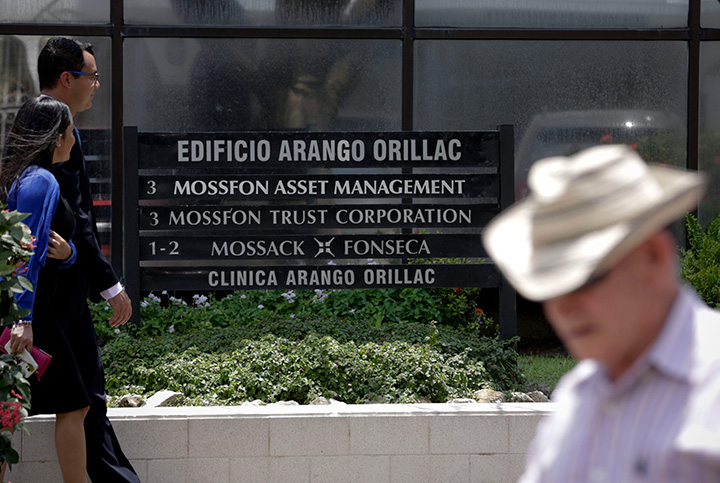BERLIN – The European Union has threatened to sanction countries like Panama if they continue to refuse to co-operate fully to fight money laundering and tax evasion, after a leak of data showed the tiny country remains a key destination for people who want to hide money.

A leak of 11.5 million documents from Panama-based law firm Mossack Fonseca showed it had helped thousands of individuals and companies from around the world to set up shell companies and offshore accounts in low-tax havens. Because such accounts often hide the ultimate owner of the money, they are a favoured tool to launder money, pay bribes or evade taxes.
So far, the scandal has brought down the leader of Iceland and raised questions about the dealings of the president of Ukraine, senior Chinese politicians, famous actors, athletes and the circle of friends of Russian Vladimir Putin, who some allege has profited indirectly from such accounts.
“People are fed up with these outrages,” said Pierre Moscovici, who heads financial affairs for the 28-nation EU. He took to task countries like Panama that facilitate such secretive, low-tax accounts.
READ MORE: RBC to comb through decades of records
“The amounts of money, the jurisdictions and the names associated with this affair are frankly shocking,” he said. Speaking of countries like Panama, he said the EU has to “be ready to hit them with appropriate sanctions if they refuse to change.”
- What is a halal mortgage? How interest-free home financing works in Canada
- Capital gains changes are ‘really fair,’ Freeland says, as doctors cry foul
- Budget 2024 failed to spark ‘political reboot’ for Liberals, polling suggests
- Tesla’s net income drops 55% in first quarter amid falling global sales
Panama is listed by the EU as a country that is not co-operative on tax issues, and Moscovici urged the country to “rethink its position in this regard.”
The Central American country’s government said late Wednesday it is creating an international committee of experts to recommend ways to boost transparency in its offshore financial industry.
President Juan Carlos Varela said the committee’s findings will be shared with other nations so joint action can be taken to boost transparency in legal and financial centres worldwide.
But Varela defended Panama against what he called a “media attack” by wealthy nations that he says are ignoring their own deficiencies and unfairly stigmatizing Panama.
Europe is also home to countries with a record of acting like tax havens and providing banking secrecy – Luxembourg, Switzerland, Andorra, among others. The United States has also become a haven, with several states including Wyoming and Delaware now popular places to open anonymous accounts that are cheap to maintain and pay little or no local tax.
READ MORE: Bank CEO defends Canada’s anti-money laundering practices
Since the first reports were published Sunday, prominent politicians, celebrities and businesspeople have had their offshore business dealings dragged into the spotlight. On Thursday, the German newspaper that first obtained the so-called Panama Papers, said it won’t publish all the files, arguing that not all are of public interest.
Sueddeutsche Zeitung received the documents from an unidentified source more than a year ago and shared at least parts of them with dozens of other media outlets around the world. It was not clear if it had shared all the data with the other media outlets or signed an accord with them on what could be reported on.
Sueddeutsche Zeitung said the complete set of 11.5 million documents “won’t be made available to the public or to law enforcement agencies. That’s because the SZ isn’t the extended arm of prosecutors or the tax investigators.”
Authorities have legal powers to obtain such documents from those suspected of wrongdoing, and in many cases there’s no public interest in revealing companies’ or individuals’ offshore business dealings, the Munich-based paper said.
Responding to readers’ queries about the absence of prominent German or American politicians in the reports, Sueddeutsche Zeitung said such names haven’t yet been found in the documents.
READ MORE: What you need to know about shell companies
It said the documents include copies of the passports of 200 Americans, and about 3,500 shareholders in offshore companies listed addresses in the United States.
“One possible reason why comparatively few Americans appear in the documents could be that U.S. citizens have no reason to contact a law firm in Panama,” the paper said. “That’s because offshore companies can easily be created in U.S. states such as Wyoming, Delaware or Nevada.”
Meanwhile, President Vladimir Putin on Thursday denied having any links to offshore accounts and described the Panama Papers document leaks scandal as part of a U.S.-led plot to weaken Russia.
Speaking Thursday at a media forum in St. Petersburg, Putin said Western media pushed the claims of his involvement in offshore businesses even though his name didn’t feature in any of the documents leaked from a Panamanian law firm.
Putin described the allegations as part of the U.S.-led disinformation campaign waged against Russia in order to weaken its government. “They are trying to destabilize us from within in order to make us more compliant,” he said.
The Washington-based International Consortium of Investigative Journalists, which co-ordinated reporting on the leaks, said the documents it obtained indicated that Russian cellist Sergei Roldugin acted as a front man for a network of Putin loyalists, and, perhaps, the president himself.
The ICIJ said the documents show how complex offshore financial deals channeled as much as $2 billion to a network of people linked to the Russian president.
—
Casert reported from Brussels. Irina Titova and Vladimir Isachenkov in Moscow also contributed to this report.

Comments